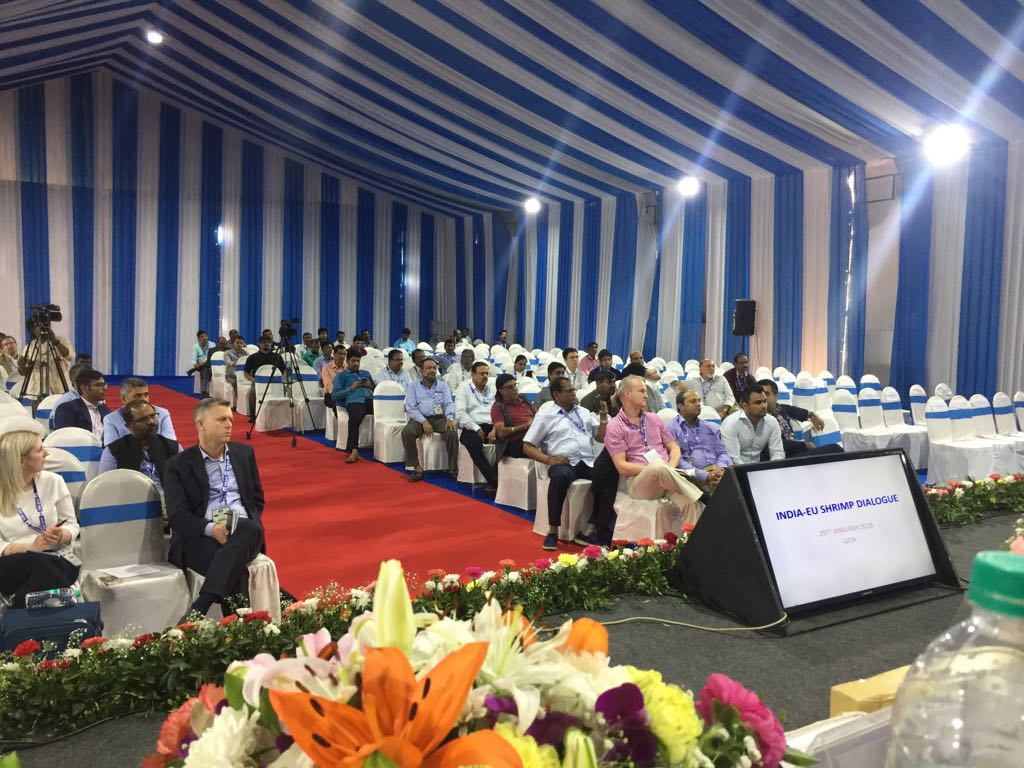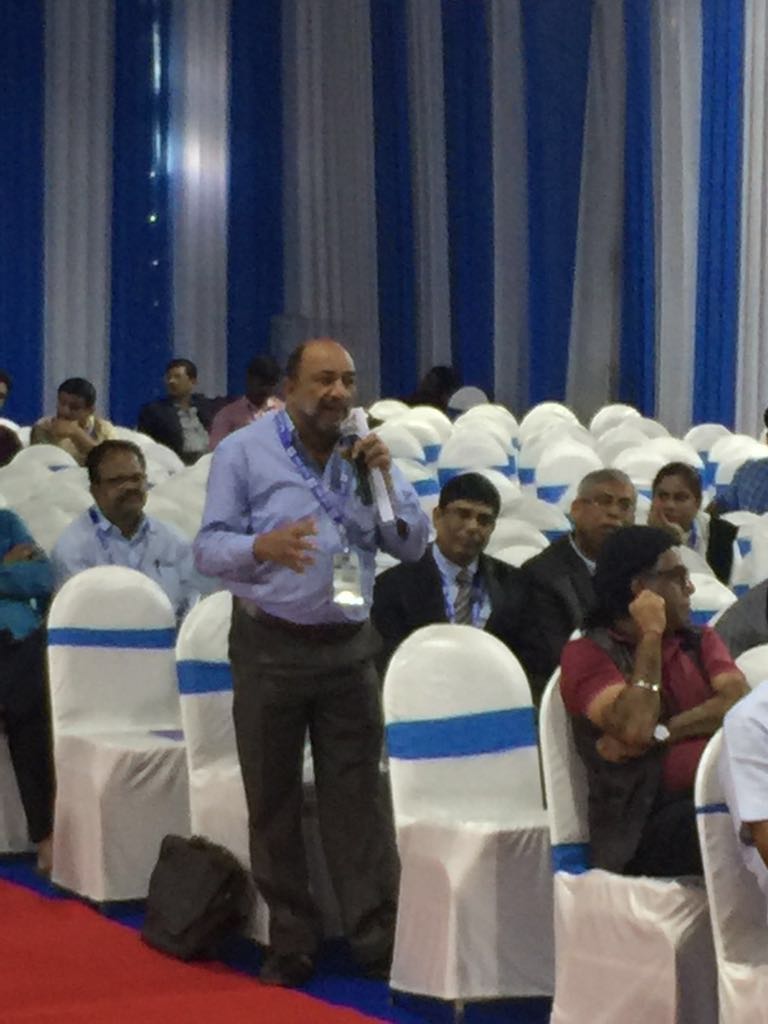Van der Pijl reiterated that the meetings in Goa were the first steps and said, “STIP and Solidaridad have requested guidance from the Indian authorities, MPEDA in particular, on how to proceed with the discourse. They have been asked, by many stakeholders, to continue the dialogue and encouraged to offer support for the interventions needed, including those needed in the sector of primary production.”
Bilateral B2B meetings reveal EU procedural uncertainty
The EU-India shrimp trade dialogue was sponsored by the Netherlands government and EU importers Klaas Puul, Seafood Connection, Nordic, Seacorin, SIPA and Belgium retailer Colruyt. It kicked off Sunday, 27 January, with a lunch meeting between buyers and suppliers of Indian shrimp. During the meeting, the attendees were invited to share their experiences and expectations on how to go forward on issues related to the measures taken by the European Union.
Around 30 Indian exporters joined the meeting and shared the challenges resulting from the new EU regulations. Currently, there is a 50% inspection rate for antibiotic residue of all containers that enter the EU and delisting measures taken if antibiotic residues are found. The most criticized measure of the EU is that, with just one rejection at an EU port, a company is immediately removed from the EU approval list. This seems to be a special measure for India as normally, after a container is rejected for antibiotics, the EU would put the next 10 containers of that company under full inspection. If no rejections are found in those 10 containers, the company would be allowed to export to the EU under normal conditions again.
One of the main worries shared by both importers and exporters was this unclear procedure for delisting as well as the vague process of relisting. For relisting, it became clear that companies need to submit a corrective action plan to the Export Inspection Council (EIC). If satisfied, the EIC would submit this plans to the European Commission, who would then decide about relisting. Many exporters complained that, while they have submitted corrective action plans already, they have heard nothing back from the EIC or European Commission. The EIC explained that they are in the process of submitting the corrective action plans of a number of companies and that news would follow soon. The EU commented that as soon as they received the plans, they will review and provide feedback to the Indian authorities.
Antibiotic use in primary production
The role of the primary producers was also introduced. The primary production of the sector, which consists of at least 70,000-100,000 shrimp farmers, was one of the root causes highlighted by several participants. They mentioned the management of primary production and the access they have to forbidden substances in their farming locations as being an important challenge to overcome for Indian authorities to prevent the misuse of antibiotics in shrimp farming. It was emphasized by the EU representative that strengthening of control measures alone might not be sufficient to address the issue but that there should also be efforts to build capacity at the farming level.

Outcomes of the multi-stakeholder meeting
On 29 January, the EU-India shrimp dialogue with the Indian government took place as a Technical Session at the IISS. A unique gathering of stakeholders were present:
-
The Indian authorities (EIC and MPEDA)
-
The EU delegate from DG Sante
-
Representatives from the Dutch embassy
-
Relevant sector associations from both India (SEAI) and Europe (SIPA)
-
Other exporters and importers
The dialogue centred around the importance of EU-India shrimp trade, the stringency of the EU regulations towards India, the commitment to be more transparent about the actions that are being undertaken by each stakeholder, and the need to work with and invest in aquaculture farmers to improve their daily practices.
The Seafood Exporters Association of India strongly requested that the EU authorities handle India in a fair way. They explained that exports from India to the EU are important for both sides and that the EU should not impose unfair measures. The EU representative emphasized that they are happy with the cooperation with Indian authorities and that they would continue to work together in the coming period, giving special mention to the Export Inspection Council. All stakeholders at the table recognized in themselves an eagerness to continue and enhance EU-India shrimp trade. STIP and Solidaridad invited everyone present to continue with this high level dialogue in the future to show a willingness to cooperate, improve and strengthen EU-India shrimp trade.
EU buyers encouraged by cooperation
After the meetings and before catching their flights, several of the EU buyers said that, although concrete solutions have not yet been identified, they felt confident of having taken a step in the right direction. They felt that the level of participation in the various meeting, from both public and private stakeholders, was encouraging. They expressed their intention to continue to work together in the crucial months ahead.
First feedback from India
An Indian attendee mentioned that it was important to have the EU delegation involved. They were able to offer the EU’s perspective on current issue in the Indian-EU shrimp trade and to confirm or discard any hearsay that has been going around in the industry. The presence of the EU delegation provided the opportunity to touch upon issue from the EU perspective, and also enabled the Indian stakeholders to voice their perspectives.
Next steps: regional dialogue and farmer outreach
To follow the high level dialogue, STIP and Solidaridad will shortly organize regional multi-stakeholder dialogues in India to continue the discussion on how to strengthen EU-India shrimp trade. An important topic in these meetings will be to find solutions for improving the management and control at the level of primary production. During the meetings in Goa, STIP and Solidaridad have requested guidance from the Indian authorities on how to organize these meetings and have urged all stakeholders to participate. One of the concrete activities to be discussed is how short educational films, explaining good aquaculture practices and alternatives for antibiotics, can be used to reach a large number of farmers quickly.
Solidaridad and STIP have requested exporters to engage in further discussions with Indian authorities and associations to determine which steps can be taken to further build upon the many activities which Indian authorities are already undertaking. Both immediate and long-term actions will need to be developed. It has also been suggested that a follow-up meeting take place during the Global Seafood Expo in Brussels on 24-26 April 2018.
Learn more about Solidaridad programmes for sustainable aquaculture.

